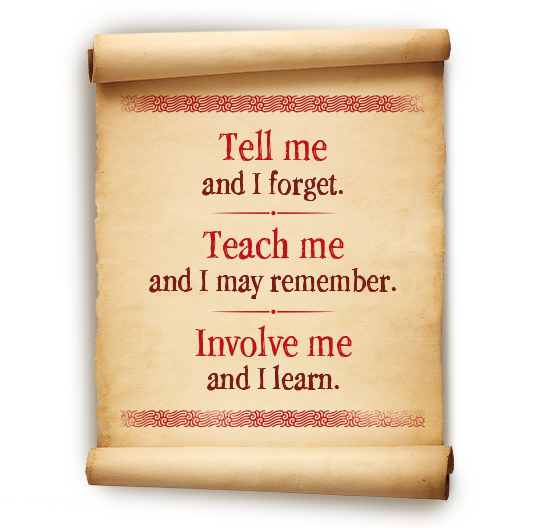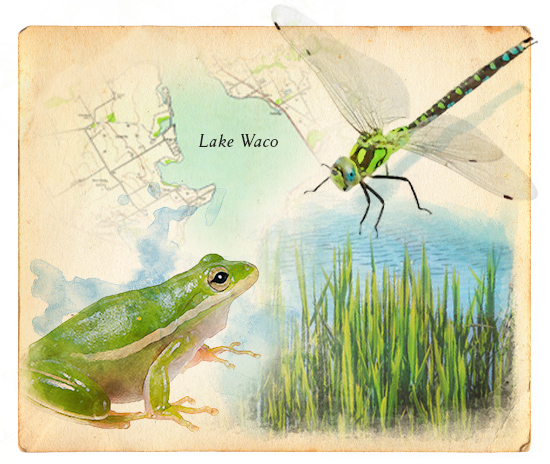How to Succeed in Business School Not Just by Trying, but by Really Doing
In the past, “hands-on learning” wasn’t usually the first thing that came to mind when someone talked about a well-rounded business school education. Business concepts were taught primarily through lecture and rote memorization. Now considered a vital part of the business curriculum, experiential learning opportunities are being increasingly integrated into the Baylor Business experience.
by Eleanor Hunt
There is a centuries-old Chinese proverb (often attributed to Confucius) that drives straight to the heart of why experiential and innovative learning (E&IL) is so essential. The proverb has many variations, but all express the same sentiment: “Tell me and I forget. Teach me and I may remember. Involve me and I learn.”
Incorporating E&IL into the Baylor Business education model is a priority for Sandeep Mazumder, William E. Crenshaw Endowed Dean of the Hankamer School of Business (HSB), because it introduces and reinforces business concepts in ways no classroom lecture or textbook can do.
“It is critical to bring real-world companies into the classrooms so students can see the application besides theory,” Mazumder said. “Having questions that companies are wrestling with is a great way for students to learn. They gain tangible skills, but also companies see the quality of our students and consider hiring them.”
A huge goal across business schools globally, E&IL was incorporated in the 2020 Business Accreditation Standards of the world’s largest association for business education, AACSB International.
“We knew the importance of ensuring experiential learning was part of the 2020 Business Accreditation Standards because of the enormous benefits it has to students across the world,” Caryn Beck-Dudley, president and CEO of AACSB International, said. “By including it in the standards, schools must demonstrate their innovative approaches and opportunities that give students hands-on experiences in the business world. Not only do many students learn better through these types of experiences, but they also help prepare them for the business world.
Building confidence
E&IL leads to greater classroom engagement and helps students build confidence in the skills they acquire for their future careers. For example, Tisha Emerson’s Environmental Economics class collaborated together to determine the estimated value of the Lake Waco Wetlands as an environmental amenity. The property is not traded on the markets, so the class applied contingent evaluation or survey techniques to find its value.
“From this exercise, students gained confidence in data collection and analysis,” Emerson, professor of Economics, said. “My students have told me that they use the contingent evaluation project as research for job interviews.”
Last fall, Emerson spent a week with the Federal Reserve Bank of St. Louis, developing additional classroom experiments and negotiation exercises to improve gender diversity in Economics.
Hope Koch, associate professor of Information Systems and Business Analytics, knows first-hand how immersive field experiences can reinforce textbook theory and academic articles. As her students study entrepreneurship through their work with nonprofit Startup Waco, they also are delving into the new name-image-likeness rules—more commonly known as NIL—governing student-athlete compensation in college football.
“The key is going into industry, working on projects with them and letting owners talk,” Koch said. “My students and I are learning about the Waco entrepreneurship community as it unfolds.”
Koch hopes these engagements with entrepreneurs will increase so that Baylor University becomes more contributory as a Solid Gold Neighbor. Baylor launched its Solid Gold Neighbor Initiative in July 2022 to serve Waco and surrounding communities in the areas of education, health, cultural wealth and economic development.
Driving innovation through ambiguity
According to Wallace Chipidza, who earned his PhD in Information Systems from Baylor and researched this area, E&IL gains traction through industry partnerships, enabling business school attendees to meld classroom/textbook knowledge with real-life events to solve problems. Chipidza, who teaches in the Center for Information Systems at Claremont Graduate University, acknowledged that innovative learning comes from facing uncertainty or ambiguous situations.
“By figuring out how to resolve some of the issues that uncertainty is causing, students and professors can present a novel response to a threat,” Chipidza said. “New technology always presents opportunities to innovate.”
A case in point was a science, technology, engineering, and mathematics (STEM) research project for a leading supply chain company. Chipidza, along with Koch and Timothy Kayworth, professor of Information Systems and Business Analytics, determined the value of a data analytical infrastructure for the company. The team observed the company’s meetings and project implementations first-hand. Thus, they were able to research higher-quality data than information derived from other sources. As a result of their research on shadow analytics, the HSB trio won the Journal of Strategic Information Systems 2021 Best Paper Award.
“We saw a phenomenon that is normally hidden and difficult to study in this company. When we are adding to the body of knowledge, which is what research tries to do, we need more access to the real world,” Chipidza said.
Thus, E&IL goes beyond the superficiality of what is revealed on the surface or through theory and delves into how businesses actually operate.
“It is only in a real environment that you can see interesting phenomena arising,” Chipidza said. “The benefit for students is that knowledge comes to life. Plus, students can forge relationships with companies that lead to employment afterward.”
Connecting with the C-suite and chambers
HSB is elevating E&IL to new heights. In early 2022, Dean Mazumder created the Office of Industry Relations and Experiential Learning under the direction of Tyrha Lindsey-Warren, faculty director and clinical assistant professor of Marketing.
“My role is reinforcing the dean’s desire to increase experiential learning. I am focused on providing support services to our faculty so we can better prepare students for the workplace,” Lindsey-Warren said.
Therefore, she conceived and spearheaded the HSB Faculty Shadowing Program pilot, which launched in the fall semester of 2022. Created in partnership with TIAA, the program helps HSB faculty keep their teaching relevant by observing C-suite executives in this Fortune 100 company. Additionally, Lindsey-Warren said another directive designed to bolster E&IL is the establishment of business salons with local chambers of commerce.
“I want to help HSB better connect with our respective chambers by determining how we can support their members and bringing some of them in for class projects,” she said.
To elevate E&IL even further, Lindsey-Warren envisions a repository database that HSB faculty could use to acquire speakers, projects, industry-specific data or a company partner for their classes.
Deepening understanding
HSB Supply Chain Management students intern with real-world companies to earn course credits. During these experiences, they acquire a deeper understanding of how the world is interconnected.
Similarly, Blaine McCormick, associate professor of Management, obtains industry experience to mentor his students and understand the global supply chain. For seven months last year, he worked in a professional internship at Baylor Scott & White Health’s logistic and distribution center.
“I worked with contracts and planned inventories,” McCormick said, “which gave me a better field of vision to accelerate and enrich the experiences of our Supply Chain Management interns.”
Now, he is collaborating with a BS&WH partner to create a case about hoarding behaviors in the medical supply chain—all to prepare business students with pertinent information.
These activities are important as experiential learning escalates at HSB, Mazumder said. He also believes experiential learning should extend to societal impact, whereby HSB delivers on its mission as a Christian business school. One way HSB achieves this is through the Volunteer Income Tax Assistance Program, in which Accounting faculty and students prepare tax returns for income-challenged families. In the spring of 2022, they completed 558 returns, yielding more than $1 million in tax refunds.
“Real lives were affected by our accounting skills. I encourage our Baylor Business family to volunteer themselves and their companies to partner with us on projects,” Mazumder said. “In this way, we can stay current and adaptable as the business world and technology continues evolving at a rapid pace.”
Baylor Business Review, Spring 2023






